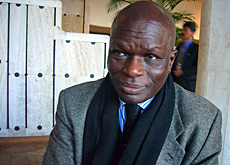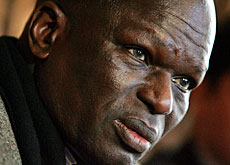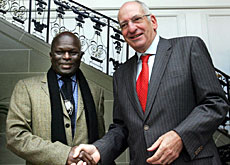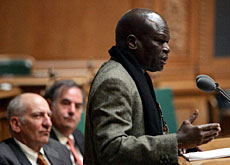Switzerland faces racism allegations

Doudou Diène, the United Nations special rapporteur on racism, has told swissinfo Switzerland urgently needs to debate racism and confront xenophobic tendencies.
The Senegalese UN envoy’s full report on racism in Switzerland will be presented at the Human Rights Council in Geneva on Tuesday.
Six months ago Diène provoked often hostile reactions after reiterating criticism of Switzerland for what he said were discriminatory tendencies. He further maintained that racism had become an instrument in political debate.
Diène had made similar comments in January 2006 when he visited Switzerland to gather information for his report into racism in ten countries. After visiting Brazil and Japan, he chose Switzerland as it was a multicultural society that had seen numerous votes affecting foreigners.
swissinfo: Your report paints a disturbing picture of Switzerland. Is this country really more blighted by racism and xenophobia than its neighbours?
Doudou Diène: In principle I avoid making comparisons because each country has its own specific demographics, culture and politics. I have however identified certain common tendencies, such as the tension between the traditional national identity and the new multicultural dynamics caused by immigration from outside Europe. Now this tension is subject to a political instrumentalisation of racism which is rightly based on a defence of the national identity.
swissinfo: But Switzerland is very proud of its multiculturalism. Is this just a new myth that is breaking down?
D.D.: It’s not a myth. As I say in my report, it is a trump card played by Switzerland to cope with this new tension concerning identity, which follows from the recent immigration of non-Europeans and Muslims. The powerful resistance that it provokes is instrumentalised politically.
swissinfo: Your report also asserts that immigration in Switzerland is essentially treated from an economic angle. But the country also has a humanitarian tradition of welcoming refugees.
D.D.: This tradition is indeed part of Swiss culture and history. But the Swiss identity is also constructed like a ghetto. The neutrality which Switzerland has always laid as a foundation of its national politics has been subject to an ethnic and racial interpretation by certain groups and people.
From this point of view I strongly criticise the treatment of immigration and asylum, which is no longer carried out according to the international treaties signed by Switzerland but according to considerations concerning identity and security. That succeeds in criminalising immigrants and asylum-seekers.
swissinfo: Those who support tightening immigration laws claim that fighting foreign criminals will ease the integration of migrants. What do you make of that argument?
D.D.: I think it is false. It rests on an ambiguous political discourse which paints a reprehensible global picture of foreigners as a threat and a risk. And the idea that you don’t necessarily have to throw the baby out with the bath water hasn’t entered the debates I’ve heard or read.
Having said that, there is evidence that there are differences of analysis and opinion within Swiss politics, as seen in the creation of the Service for Combating Racism, the Federal Commission against Racism and the Federal Commission for Foreigners.
Meeting various ministers, I have noticed a diversity of opinions regarding these questions – and that is positive.
swissinfo-interview: Frédéric Burnand in Geneva
The UN special rapporteur on racism carries out visits to various states to see if there are problems related to discrimination.
After these visits, he submits a report to the UN’s Commission on Human Rights.
In 2002, Switzerland invited all the UN’s special rapporteurs to visit the country and file their conclusions.
The special rapporteur on racism notes that the Swiss authorities … have recognised the existence of problems linked to racism and xenophobia, but believe these problems … are only a “second-class phenomenon”.
He remarks that this assessment varies depending on the department and how high up the hierarchy the interviewee is: those nearer social reality [i.e. lower down the hierarchy] recognise more openly the manifestations of racism, racial discrimination and xenophobia. However this recognition becomes more diffuse as one goes higher up the hierarchy.
The members of foreign communities and national minorities who spoke to Diène explained, often with great emotion, how they experienced on a daily basis racism, discrimination, a xenophobic atmosphere, a feeling of loneliness within the population and fear of certain institutions, notably the police.

In compliance with the JTI standards
More: SWI swissinfo.ch certified by the Journalism Trust Initiative












You can find an overview of ongoing debates with our journalists here . Please join us!
If you want to start a conversation about a topic raised in this article or want to report factual errors, email us at english@swissinfo.ch.